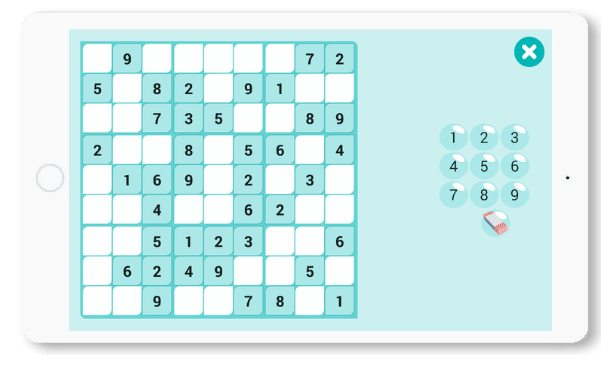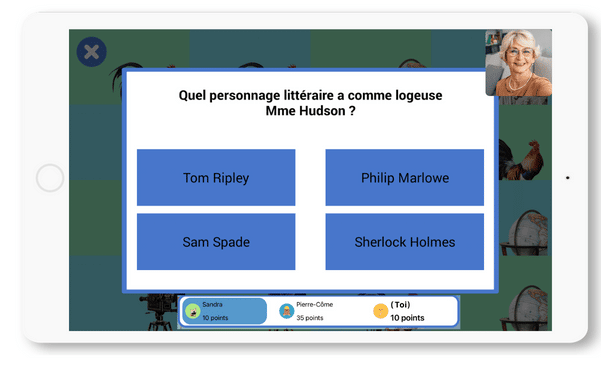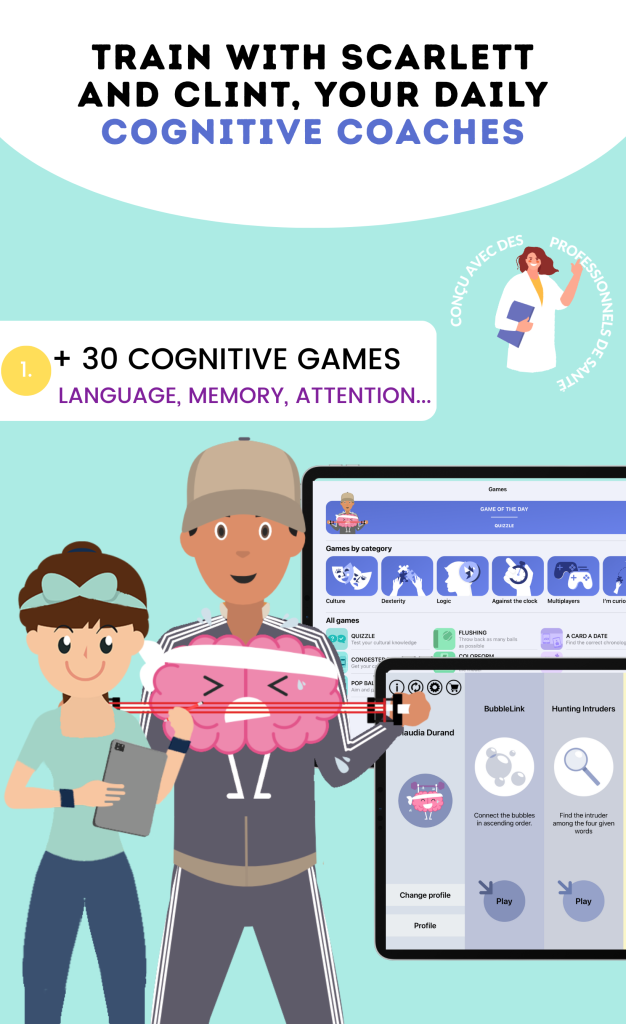Your overall health can be maintained or improved by taking the time to establish good habits. For example, it will be important to apply some tips to take care of your mental health and thus easily maintain a balanced life.
As we age, we know that our cognitive functions become more reliable. Additionally, one may be affected by a neurodegenerative disease, such as Alzheimer’s’s, which manifests with cognitive function disorders.
If you are already affected by a disease like Alzheimer’s’s or if this disease has affected one of your loved ones, you can continue to engage in activities for mental health to slow cognitive decline and keep the person with Alzheimer’s’s as independent as possible for as long as possible. It is important to support a person with Alzheimer’s’s to provide them with all possible support.
You should not wait until you have difficulties to start training your brain. On the contrary, it is important to start early to stimulate cognitive functions in order to improve your skills and reduce the risk of potential age-related dementia.
If you don’t know how to get started, you can begin by discovering our 10 daily tips to follow. So don’t wait any longer to read on!
1. Choose Your Relationships Wisely
It is important to maintain social relationships in your life to surround yourself and avoid a strong feeling of loneliness. However, maintaining relationships will not be enough; you will also need to take the time to choose the right people. Indeed, we advise you to surround yourself with healthy relationships that will bring you positive elements above all. This will allow you to enjoy each exchange by benefiting from a positive element.
Being surrounded by people gives you the motivation to go out and engage in activities. Keeping the brain and body active is very important. In addition to being useful for the brain, maintaining good relationships helps to keep a good mood. Isolation and depression can be one of the causes related to cognitive disorders.
2. Humor
Take the time to develop your sense of humor to enjoy pleasant discussions daily with your loved ones. To make humor, your brain must make logical associations, think of a way to make a situation funny, and also adapt what to say based on the people present. But nurturing your sense of humor will also help you laugh more easily by enjoying every positive element in your life.
When we laugh, we stimulate dopamine, which promotes the feeling of pleasure, and at the same time, we reduce cortisol levels, which is the stress hormone.
Laughter thus allows us to relax physically and mentally.
So use humor to help others and yourself!
3. Enjoy the Present Moment
If you tend to do several things at once, you will need to learn to limit yourself to focus on one task. This will help you enjoy what you are doing to fully live the moment. Every time we do something, we always think about what we could have done differently, the things we need to do afterward, or situations from the past. The result is that we do not live in the present and lose the opportunity to enjoy life.
Stop to observe things and truly enjoy them. When you walk, look around you, discover the shapes of the clouds, the flowers in the gardens, or a new restaurant on the street. When you talk to someone, try to create memories of that moment and focus on the relationship.
If you manage to enjoy the present moment and clear your mind of negative thoughts or tasks you need to do afterward, you will be more serene and improve your mental health.
4. Enjoy Your Free Time
It is completely normal to want to make the most of every second to complete various tasks. But you will also need to dedicate time to your hobbies. You can schedule different moments for your pastimes to stimulate yourself to keep your brain active very easily.
Enjoying your free time by doing something you love allows you to put yourself at the center of your life. Today, we live in a society where priorities are work, money, material objects… We should not forget these aspects of life, but we must remember that we are the active character in our lives. Therefore, we must be at the center of our lives and do what we love.
Additionally, dedicating time to your hobbies helps you relax and reduce stress.
5. Volunteer
Volunteering is a great way to feel useful and to feel that your day has been productive. You will thus be able to play an important role while improving your well-being. There are many associations, so you will have no trouble finding one that you wish to help by dedicating a little time to it.
Volunteering helps your mental health, but above all, it helps others. Also, a small gesture can make a difference and improve the society in which we live.
Moreover, you can create what is called the “butterfly effect.” This effect is a metaphor that means that one action can provoke another, and this can provoke yet another according to the principle of cause and effect. According to this principle, a small butterfly’s wing flap can, hypothetically, create a tornado. In the same way, a positive gesture from you can have a significant result in someone else’s life or in society as a whole.
6. Set Goals
You need to set achievable goals in order to take steps forward. This will help you feel good and effective!
It is important to set realistic goals and to break them down into steps. This way, you take control of your life and realize your dreams. Having goals helps to stay motivated throughout the day and remain active.
Additionally, achieving your goals increases your self-esteem and self-image. You feel capable of doing things and are proud of yourself.
7. Be Active
Take the time to go out and exercise physically whenever you can. This will help stimulate your well-being while reducing stress risks.
Exercising increases the production of endorphins, which give a feeling of well-being. Additionally, exercising allows us to clear our minds and distance ourselves from all negative thoughts.
You can exercise in various ways, more or less dynamically. You can go running, go to the pool, but also walk or do yoga. Everyone should find the activity that is most suitable for their physique and skills and should enjoy doing it.
Moreover, if you participate in group activities, it is a good way to meet people, talk to them, and maintain relationships. As we have seen in this article, it is important to surround ourselves with people.
8. Rest
Take the time to close your eyes and rest for a few minutes to regain a calm mind.
Resting is very useful for the body, for the brain, and therefore for mental health. When we engage in activities, our cognitive functions are always active to detect stimuli, to be attentive, to analyze the environment, and to memorize important information.
Sleep at night is the most important. When night falls, our brain and body send us signals to ask for sleep. During the night, the brain can process all the information acquired during the day, memorize it, and create links with other knowledge.
9. Focus on the Positive
Happy memories will help you find comfort and focus on the positive at every moment of your life.
The way you view your life influences your mood and thus your predisposition in daily activities.
A smile can change your day, so don’t hesitate to seek out the positive in your activities.
If you want, you can write down the positive things from the day every evening. Writing down the positive things of the day helps you keep the memories of it, but also go to sleep in a state of serenity.
10. Keep Your Brain Active
The best activity to improve your mental health is to keep your brain active. Our mental health starts to weaken when we have difficulties with cognitive functions such as memory, attention, or logic.
There are several activities to train your brain, such as sudoku, crossword puzzles, or general knowledge quizzes.
Clint is an application that offers more than 30 games to improve all cognitive functions while having fun. In a single application, you have all the games, and each day, you can choose the game you like.
Sudoku
Solve the grid according to the rules of sudoku at an easy, medium, or difficult level. Sudoku allows you to improve your logic and strategy.

Quizzle
Answer general knowledge questions. With several categories available, you can challenge yourself in all areas.
Play with your friends or family to see who knows the most answers!

Discover Clint
11. Practice Meditation
Meditation is a practice that improves mental health by reducing stress and increasing concentration. It helps to calm the mind and refocus on oneself. Here are some benefits of meditation:
- Reduction of anxiety and stress
- Improvement of concentration and attention
- Increase in creativity
- Improvement of emotional well-being
There are different meditation techniques, such as mindfulness meditation, guided meditation, or transcendental meditation. You can start with a few minutes a day and gradually increase the duration.
12. Balance Your Diet
A balanced diet plays a crucial role in mental health. The nutrients we consume have a direct impact on our mood and well-being. Here are some tips for a brain-friendly diet:
- Consume omega-3s, found in fatty fish, to promote brain health.
- Include fruits and vegetables rich in antioxidants to protect brain cells.
- Avoid refined sugars and processed foods that can affect mood.
- Drink enough water to stay hydrated, as dehydration can lead to fatigue and mood disorders.
Taking the time to prepare healthy meals can also be a relaxing and rewarding activity.
13. Connect with Nature
Spending time outdoors and connecting with nature can significantly improve your mental health. Here are some benefits of this connection:
- Reduction of stress and anxiety
- Improvement of mood and overall well-being
- Stimulation of creativity and concentration
- Encouragement of physical activity
Try to take regular walks in parks, forests, or near water. Even a few minutes spent outside can have positive effects on your state of mind.
14. Learn New Skills
Learning new skills is an excellent way to stimulate your brain and improve your mental health. Here are some activity ideas to try:
- Take music lessons or learn to play an instrument.
- Learn a new language to stimulate cognitive functions.
- Try artistic activities like painting, drawing, or sculpting.
- Participate in cooking or baking workshops to develop your culinary talents.
These activities not only stimulate your brain but also allow you to meet new people and create social connections.








